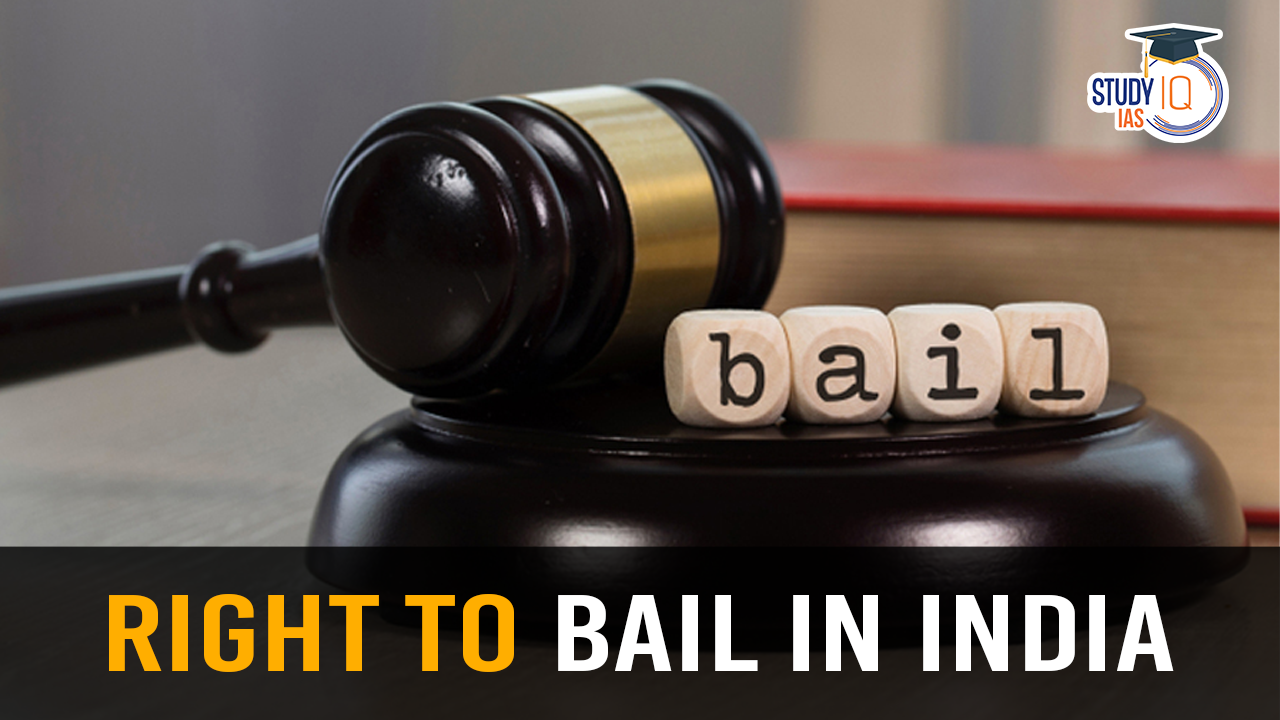Table of Contents
Context: Recently, U.S. President Donald Trump signed an executive order targeting cashless bail in the United States, arguing that it leads to a rise in crime. This has revived debates on how bail systems operate differently across countries, including India.
Supreme Court Upholds Bail Provisions
In a series of recent rulings, the Supreme Court of India has reasserted the principle that bail should be the rule and jail an exception while emphasising the sacrosanct nature of individual liberty under Article 21 of the Constitution.
What is Bail System?
- It is the legal process of releasing an accused person from custody, usually on the condition that they will appear in court for trial.
- Purpose:
- To ensure the presence of the accused during trial.
- To balance the right to personal liberty with the interest of justice and public safety.
- Bail may involve monetary deposits, sureties, or personal undertakings depending on the legal system.
Bail Provisions in India
- It is the conditional release of an accused from jail with a promise (generally on a bail bond or personal bond) to appear in court when required.
- Bail involves the temporary release of an individual accused in a criminal case pending the court’s final decision.
- The Code of Criminal Procedure, 1973, outlines the bail conditions in India but does not explicitly define “bail,” although it does categorise offences as “bailable” and “non-bailable.” Governed by Chapter 35 of the Bharatiya Nagarik Suraksha Sanhita (BNSS), 2023 (earlier CrPC, 1973).
- Bailable Offences: For bailable offences, an individual has the right to bail.
- Non-Bailable Offences: In cases involving non-bailable offences, the granting of bail is at the discretion of the courts or designated police officers.
| Fact |
|
| Related Concepts |
|
Types of Bail
- Regular Bail: This type of bail allows an accused person to be released from custody to ensure their presence at trial.
- Interim Bail: Granted temporarily, this bail remains effective during the period a bail application (regular or anticipatory) is under consideration.
- Anticipatory Bail (Section 482 of BNSS): This form of bail is provided to individuals expecting arrest for a non-bailable offence.
- Statutory/Default Bail: According to the law, if the State fails to file a charge sheet within the maximum period allowed for investigation (90 or 180 days from the arrest), the accused is entitled to be released on bail. This form of bail is referred to as ‘default bail’ or ‘statutory bail’.
- Bond: Accused signs a promise to appear in court.
- Bail Bond: A surety (family/friend/employer) guarantees the accused’s presence, sometimes with payment.
- Personal Recognisance (PR) Bond: Release without monetary payment, only a written promise, usually when the accused cannot afford bail.
Concerns Regarding India’s Bail System
- High Undertrial Population: Over 75% of India’s prison population consists of undertrials.
- Flaws in the criminal justice process are due to which Indian prisons face severe overcrowding, with a rate of 118%.
- Despite Supreme Court guidelines encouraging bail, Courts frequently impose strict bail conditions or deny bail without clearly explaining their rationale.
- Marginalised individuals are more vulnerable.
- Many remain in jail even after being granted bail due to difficulties in fulfilling bail conditions (such as inability to arrange money or property, find local sureties, lack of identity proof, and family abandonment).
- Many disadvantaged individuals are excluded from safeguards against arbitrary arrest, contributing to their high representation in the undertrial population.
- Example: FTP data shows that 18.50% of undertrials were migrants, 93.48% owned no assets, 62.22% had no family contact, and 10% had prior incarceration, indicating systemic neglect of vulnerable groups.
- The current system assumes that all arrested individuals can afford bail or have social connections which makes the rule of ‘bail, not jail’ meaningless for many undertrial prisoners.
Bharatiya Nyaya Sanhita (BNS)
The introduction of the Bharatiya Nyaya Sanhita (BNS), 2023, has led to significant updates in bail regulations while maintaining the core principles of bail.
- Example: Section 483 of BNSS covers these special powers of the High Court and Court of Session to grant bail.
Key Changes Under Bharatiya Nyaya Sanhita (BNS) 2023
- Bail for First-Time Offenders: First-time offenders who have completed one-third of their prescribed jail term may be granted bail, except in cases involving death or life imprisonment sentences. This change aims to decrease the number of undertrial prisoners.
- Timely Bail Application Processing: The BNS mandates the swift handling of bail applications to avoid extended detentions of undertrial inmates.
- Bail Consideration Post-Charge Sheet: Courts are now instructed to consider bail for accused individuals in custody once a charge sheet is filed, unless strong reasons exist to refuse bail.
- Special Considerations for Vulnerable Groups: The BNS continues to provide specific relief for women, children, and the ill, facilitating easier access to bail for these groups.
Issue
Many undertrial prisoners remain in jail despite bail being granted, because they cannot afford even small surety amounts (as low as ₹5,000).
Reforms
- The Supreme Court (2023) directed Legal Services Authorities to assist poor undertrials.
- The Law Commission (268th Report, 2017) called monetary bail discriminatory and against the constitutional ethos.
Supreme Court Observations
| Related Cases |
|
Challenges Associated
- High Undertrial Population: A significant proportion of India’s prison population consists of undertrials, who remain in custody for extended periods due to sluggish bail processes and systemic inefficiencies This has resulted in overcrowded prisons, with occupancy rates exceeding official capacities significantly.
- Example: India’s criminal justice system has over 75% of prisoners awaiting trial and prisons operating at 118% capacity.
- Socio-Economic Barriers: A lack of financial resources to arrange for bail bonds or local sureties is a major hindrance, particularly affecting those from marginalised backgrounds. The lack of residence or identity proof and familial support further complicates their ability to meet bail conditions.
- Example: Data from the Fair Trial Programme (FTP) in Yerwada and Nagpur central prisons reveals that 93.48% of undertrials represented by the FTP did not own any assets, making it challenging for them to meet bail requirements
- Judicial Discretion and Lack of Transparency: The discretion granted to courts in bail matters often results in strict conditions or outright denial of bail, especially without clear, recorded reasons. This lack of transparency in decision-making processes can lead to inconsistent bail adjudications.
- Flawed Assumptions and Inadequate Legal Support: There is an underlying assumption that accused individuals will have the financial means or property required to meet bail conditions. Moreover, undertrials often lack adequate legal support to navigate these challenges effectively.
- Delays in Bail Compliance: Studies indicate that even after bail is granted, a significant percentage of undertrials are unable to comply with the conditions promptly, leading to prolonged detention.
Suggestions For Improvement
- Enacting specific legislation aimed at bail reform to ensure more consistent and fair bail practices.
- Re-evaluating judicial approaches to bail, ensuring decisions are well-documented and reasons for bail denial are clearly stated.
- Implementing support systems to help undertrials meet bail conditions, especially those from disadvantaged backgrounds.
- Advocating for a shift in perspective from ‘bail not jail’ to truly upholding the presumption of innocence until proven guilty.
Bail in India vs. the US
| Aspect | India | United States |
| Governing Law | Bharatiya Nagarik Suraksha Sanhita (BNSS), 2023 | State-specific laws; guided by judicial precedents |
| Types of Bail | Bond, Bail Bond (with surety), PR Bond | Cash Bail, Cashless Bail (in some states), Surety Bond |
| Purpose | Ensure the appearance of the accused in the trial; balance liberty with justice | Ensure the accused does not abscond or tamper with witnesses |
| Monetary Element | Often requires a surety or bond; can be waived via PR bond | Strong reliance on cash bail deposits |
| Key Concern | Many undertrials remain jailed for the inability to pay even small amounts | Cash bail keeps poor people in jail; the rich can pay and be released |
| Reform Efforts | SC guidelines for undertrials; Law Commission suggests less monetary focus | Some states experimenting with cashless bail; Trump’s order seeks to limit it |
Way Forward for Bail System Reforms
- Revise Bail Laws: Amend existing bail laws to ensure they are fair and equitable for all individuals, irrespective of their socio-economic background, addressing systemic issues that contribute to the high undertrial population.
- Enact Special Bail Legislation: Follow the Supreme Court’s recommendation to introduce special bail legislation similar to the UK’s Bail Act, establishing a general right to bail and clearly defining criteria for bail decisions, reducing the dependence on monetary bonds and sureties.
- Provide Legal Aid for Bail Compliance: Offer legal aid and support services to undertrial prisoners to help them comply with bail conditions and ensure their appearance in court.
- Inclusive Safeguards Against Arbitrary Arrest: Strengthen safeguards against arbitrary arrests, ensuring they are accessible and inclusive, especially for disadvantaged and vulnerable groups.
- Support Programs for Bail Compliance: Implement support programs that provide undertrials with access to legal aid, financial assistance, and social services to help meet bail conditions and facilitate their release.
- Collaborative Approaches to Bail Reform: Encourage collaboration between government agencies, legal institutions, civil society organisations, and community groups to develop comprehensive and holistic solutions to bail reform.
- Ongoing Monitoring and Evaluation: Establish mechanisms to continuously monitor and evaluate bail reform efforts to assess their effectiveness and identify areas that require further improvement.


 List of Chief Ministers of Maharashtra F...
List of Chief Ministers of Maharashtra F...
 Electoral System in India 2026: SIR Upda...
Electoral System in India 2026: SIR Upda...
 SLAPP Suits: Meaning, Examples, Impact o...
SLAPP Suits: Meaning, Examples, Impact o...




















